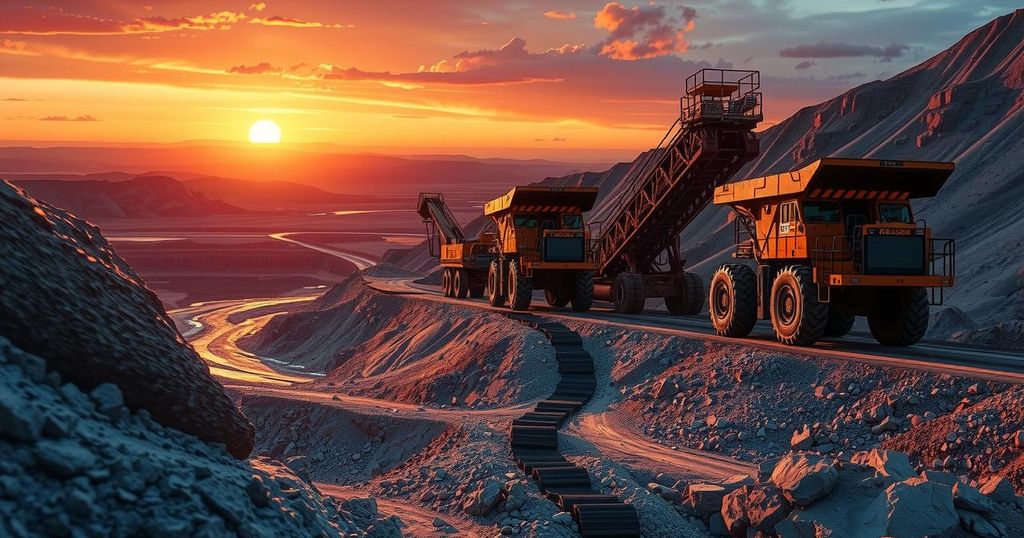The DRC is negotiating a mining deal with the Trump administration to leverage its mineral resources while seeking U.S. military support against M23 rebels. The talks have generated concerns about governance and transparency. Recent U.S. sanctions on Rwanda may influence the negotiations, marking a notable shift in alliances as the DRC looks to diversify foreign partnerships away from China.
The Democratic Republic of the Congo (DRC) is engaging in preliminary discussions with the Trump administration regarding a potential mining agreement to leverage its rich mineral resources. The DRC, which holds vast reserves of critical minerals like cobalt and coltan, seeks U.S. support in combatting the M23 rebels and Rwandan forces in the eastern regions of the country. Details about the agreement are still sparse as negotiations progress.
The U.S. State Department has acknowledged its openness to a mining partnership, confirming that talks have begun. With the ongoing offensive by M23 rebels exerting pressure on the Congolese military, the DRC’s authorities are particularly keen on reinforcing their security through this partnership while improving their economic outcomes from resource extraction.
Discussions about the minerals deal were first brought to light by Congolese President Felix Tshisekedi, who proposed a strategic partnership in an interview with The New York Times. He expressed hopes that Western intervention could stabilize the region and counteract Rwandan influence on DRC’s resources. Further, a proposal offered through a local senator included operational control over a port to facilitate mining exports.
However, some experts, including Jason K. Sterns, cautioned that the details of the proposal seem unrealistic, particularly the idea of deploying U.S. troops on the ground, which could conflict with Trump’s stated foreign policy aims. The Congolese military’s current vulnerability further emphasizes the need for international support, particularly from the U.S.
Concerns over transparency and governance emerged during discussions, with critics pointing out that any deal should involve broader public consultation rather than backroom negotiations. Officials assert that the aim is to diversify bilateral collaborations, not to merely trade minerals for military assistance, while also emphasizing rightful ownership of their resources.
Congolese officials have remarked on the significance of recent U.S. sanctions against Rwandan officials allegedly involved in exploiting DRC’s mineral wealth, marking an increased focus on accountability. The resolutions from international bodies highlight the extensive taxation imposed by the M23 on mining activities, underlining the group’s economic impact.
The DRC’s appeal for Western investment reflects a shift away from China’s dominance in the region, where Chinese firms currently control a majority of mining operations. Despite Tshisekedi’s dual diplomatic approach, the recent push seems to signal a stronger inclination towards U.S. collaboration to mitigate reliance on Chinese support.
Negotiating a mining deal presents considerable operational challenges, especially since much of the valuable mineral concessions are already held by private companies. The lack of active U.S. companies in the DRC highlights past complications, like the fallout from Freeport-McMoRan’s exit in 2016. Current discussions are notable for the potential they hold to re-engage U.S. interests tied to DRC’s mineral wealth.
In the backdrop, Congolese officials and U.S. representatives are continuing efforts to find synergies, with intentions from both sides to finalize negotiations soon. President Trump is reportedly considering appointing a special envoy dedicated to DRC mineral deal assessments, indicating a serious commitment to this emerging partnership.
The DRC’s proposed agreement with the Trump administration highlights the dual goals of securing military support against regional threats and enhancing economic outcomes from its extensive mineral wealth. As discussions progress, the focus remains on ensuring transparency and benefiting the Congolese population while navigating existing challenges with international investments, particularly in light of China’s current dominance. The engagement indicates a potential shift in geopolitical alignments in the mining sector of the DRC.
Original Source: www.france24.com






